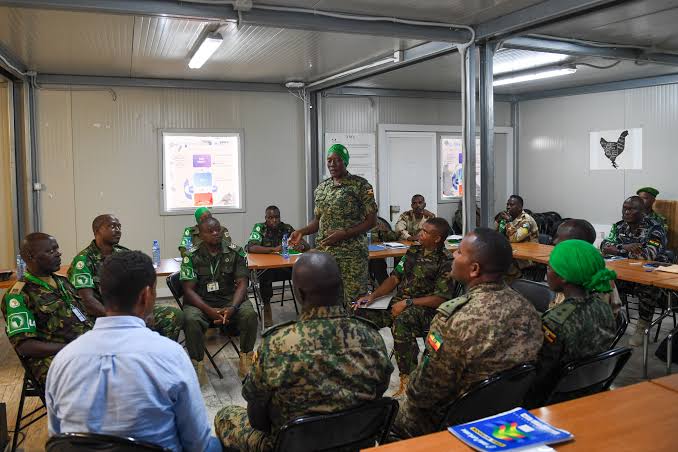Facebook Twitter (X) Instagram Somali Magazine - People's Magazine
Fourteen officers from the Burundi National Defence Force (BNDF), serving with the African Union Transition Mission in Somalia (ATMIS), recently concluded an intensive four-day training on Civil-Military Cooperation (CIMIC). The training, held in Mogadishu, focused on equipping officers with the skills necessary to foster effective collaboration between military forces and civilian stakeholders in conflict zones.
Jointly organized by the ATMIS CIMIC Cell and the United Kingdom-Mission Support Team (UK-MST), the program combined theoretical learning with practical exercises. The goal was to enhance the officers’ understanding of CIMIC principles, enabling them to facilitate coordination and build trust with local communities, government authorities, NGOs, and international agencies.
Key Objectives and Outcomes
During the closing ceremony, Major General Marius Ngendabanka, ATMIS Deputy Force Commander in Charge of Operations and Plans, emphasized the importance of CIMIC in mission success. “This training has provided participants with the knowledge and skills necessary to strengthen civil-military interactions. I urge you to apply what you’ve learned in your daily operations to build stronger community ties,” he stated.
Colonel Ben Ramsey, Commander of the UK’s Operation TANGHAM, echoed these sentiments, stressing the need to “win the hearts and minds” of local populations. He noted that CIMIC plays a critical role in reassuring communities of the military’s protective intent.
Participants gained practical knowledge in areas such as planning civil-military activities, assessing local environments, conducting negotiations, coordinating humanitarian aid, and incorporating gender perspectives into their operations.
Practical Applications in the Field
The training also addressed the role of the Joint Operations Centre (JOC) in facilitating partnerships between military forces, the Somali National Army (SNA), and external agencies. CIMIC officers from various operational bases shared their experiences, highlighting the program’s relevance to their work.
Captain Niyondavyi Ange Salvatrice, a participant stationed in Jowhar, explained, “The training has enhanced my ability to communicate effectively with civilians, helping to foster trust and cooperation.” Major Ntihinyuzwa Charles from Mahaday Forward Operating Base added, “I’ve learned how to strengthen coordination among partners to achieve our mission’s objectives.”
A Collaborative Effort for Regional Stability
ATMIS CIMIC Staff Officer Lt. Col. Gregoire Ndikumazambo noted during the opening ceremony that the course was designed to prepare officers for frontline operations, emphasizing collaboration with both Somali forces and international stakeholders.
This initiative underscores ATMIS’s commitment to promoting stability in Somalia through civil-military collaboration. By strengthening relationships with local communities, the mission aims to enhance its operational effectiveness and contribute to long-term peacebuilding efforts.
The Role of CIMIC in Peacekeeping Missions
Civil-Military Cooperation is a critical component of modern peacekeeping operations, enabling military forces to operate effectively in civilian environments. Through initiatives like these, ATMIS is bridging gaps between military and civilian actors, ensuring that humanitarian needs are met while maintaining security.
Looking Ahead
As Somalia continues its journey toward stability, programs like the CIMIC training play a vital role in fostering trust and cooperation between military forces and local communities. The knowledge and skills imparted during this training will undoubtedly contribute to the broader goals of ATMIS and its partners in Somalia.
Through this training, ATMIS reinforces its role as a key player in Somalia’s peacebuilding efforts, ensuring that its personnel are equipped to handle the complexities of modern conflict zones.

